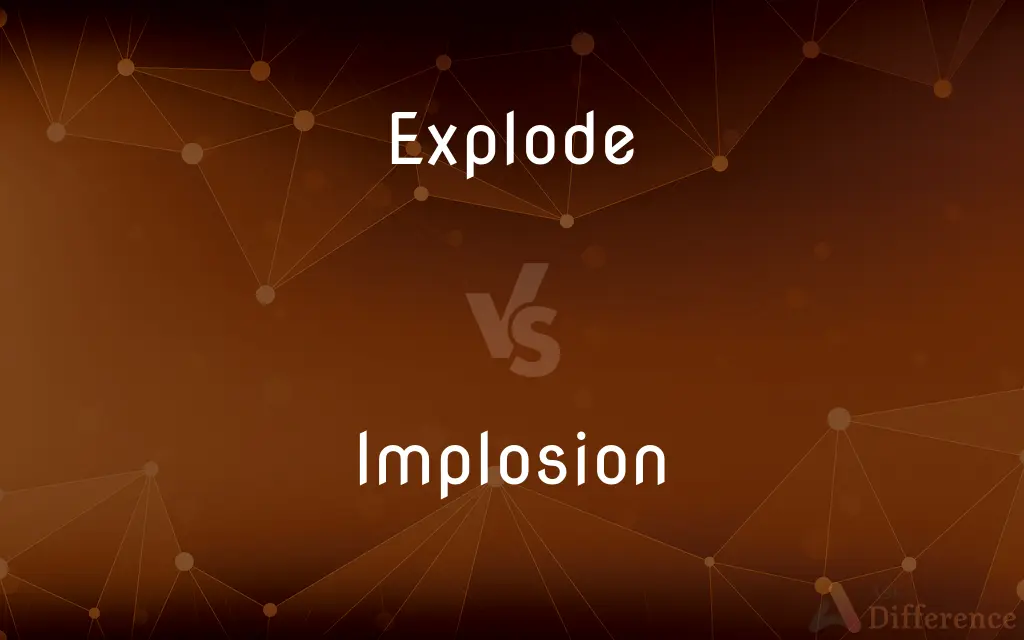Explode vs. Implosion — What's the Difference?
By Tayyaba Rehman — Updated on September 26, 2023
Explode involves a violent release of energy outward, usually with a loud noise and damage, while Implosion is a collapse inward under external pressure, often controlled and quiet. They are opposites in directionality.

Difference Between Explode and Implosion
Table of Contents
ADVERTISEMENT
Key Differences
Explode and Implosion, while both involve rapid transformations of objects, are fundamentally opposite in their actions and outcomes. To explode is to burst outward suddenly and violently, often accompanied by noise, flames, and destruction, typically due to rapid release of energy or pressure. Implosion, in contrast, is the process of collapsing or bursting inward, often due to external pressure or a vacuum, and can be more controlled and less noisy than explosions.
Explode typically creates a chaotic, destructive outward force that can cause extensive damage to surrounding areas and objects, emanating energy, heat, and potentially shrapnel in all directions. Implosion, however, is characterized by inward force, where materials collapse into the void or space that the object occupied, usually causing less collateral damage, with debris moving inward rather than outward.
In terms of usage, the word explode is often associated with explosive materials, sudden reactions, and violent events, used to describe scenarios ranging from chemical reactions to emotional outbursts. Implosion is used less frequently and is more associated with structural failures, advanced demolition techniques, or specific physical phenomena, where a structure or object collapses inward due to unequal pressure or structural compromise.
Sound is another contrasting factor between explode and implosion. Exploding typically produces loud and sudden noises due to the rapid release of energy and the breaking apart of materials. Implosions, however, might not be as loud or noticeable, as they involve the inward collapse of structures, which may not produce as much noise or shock waves.
In summary, to explode is to burst outward with energy and potential destruction, and it has varied and widespread usage. Implosion is the opposite, involving inward collapse usually due to external pressure or vacuum, often more controlled and specific in its application, leading to different impacts and consequences.
ADVERTISEMENT
Comparison Chart
Directionality
Outward burst or release of energy
Inward collapse under pressure
Associated Sound
Loud, violent due to rapid release of energy
Quieter, less noticeable as it's an inward collapse
Usage Frequency
More common, used in various contexts
Less common, more specific contexts
Destruction Pattern
Causes extensive damage to surrounding areas and objects
Causes less collateral damage, debris moves inward
Typical Associations
Explosive materials, violent events, emotional outbursts
Structural failures, advanced demolition techniques
Compare with Definitions
Explode
To expand outward suddenly and usually violently due to the force of internal pressure or the release of chemical or nuclear energy
The bomb exploded.
Implosion
A sudden failure or collapse due to internal pressure.
The company faced an implosion due to escalating internal conflicts.
Explode
To burst violently as a result of such expansion.
Implosion
The action of collapsing inward violently.
The old building’s implosion was meticulously planned to avoid collateral damage.
Explode
To shatter with a loud noise
The vase exploded into tiny pieces when it hit the floor.
Implosion
The act of something being sucked inward.
The submarine suffered an implosion at great depths due to the immense water pressure.
Explode
To make an emotional outburst
My neighbor exploded in rage at the trespassers.
Implosion
The inward collapse of a structure, usually controlled and deliberate.
The skilled demolition team initiated the implosion of the obsolete tower.
Explode
To increase suddenly, sharply, and without control
The population in this area has exploded during the past 12 years.
Implosion
A sudden, violent inward collapse, often associated with a vacuum.
Scientists studied the implosion of a star in a distant galaxy.
Explode
To change state or appearance suddenly
Over the weekend the trees exploded with color.
Implosion
An instance of something collapsing violently inwards
The star undergoes a violent implosion caused by gravity
Explode
(Sports) To hit a golf ball out of a sand trap with a shot that scatters the sand.
Implosion
A violent collapse inward, as of a highly evacuated glass vessel.
Explode
To cause to release energy or burst violently and noisily
The children exploded three firecrackers.
Implosion
Violent compression.
Explode
To show to be false or unreliable
Explode a hypothesis.
Implosion
The inward collapse of a building that is being demolished in a controlled fashion by the weakening and breaking of structural members by explosives.
Explode
(Sports) To hit (a golf ball) out of a sand trap with an explosive shot.
Implosion
A catastrophic failure
The economy's implosion during the credit crisis.
Explode
(transitive) To destroy with an explosion.
The assassin exploded the car by means of a car bomb.
Implosion
(Linguistics) The pronunciation of a stop consonant with the breath drawn in.
Explode
(transitive) To destroy violently or abruptly.
They sought to explode the myth.
Implosion
The inrush of air in forming a suction stop.
Explode
(transitive) To create an exploded view of.
Explode the assembly drawing so that all the fasteners are visible.
Implosion
The action of imploding.
Explode
To disprove or debunk.
Implosion
The act or action of bringing to or as if to a center.
Explode
(intransitive) To fly apart with sudden violent force; to blow up, to burst, to detonate, to go off.
The bomb explodes.
Implosion
Violent compression.
Explode
To make a violent or emotional outburst.
She exploded when I criticised her hat.
Implosion
A catastrophic failure; a sudden failure or collapse of an organization or system.
Explode
To increase suddenly.
Implosion
A bursting inwards, as of a vessel from which the air has been exhausted; - contrasted with explosion.
Explode
To ejaculate.
Implosion
The inward-moving detonation wave cause by detonation of explosives arrayed spherically around a core; - a technique used in atomic bombs to compress fissionable material to allow a chain reaction time to produce an explosion of the fissionable material.
Explode
To break (a delimited string of text) into several smaller strings by removing the separators.
Implosion
A sudden compression of the air in the mouth, simultaneously with and affecting the sound made by the closure of the organs in uttering p, t, or k, at the end of a syllable (see Guide to Pronunciation, 159, 189); also, a similar compression made by an upward thrust of the larynx without any accompanying explosive action, as in the peculiar sound of b, d, and g, heard in Southern Germany.
Explode
To decompress (data) that was previously imploded.
Implosion
A sudden inward collapse;
The implosion of a light bulb
Explode
(transitive) To open all doors and hatches on an automobile.
Implosion
The initial occluded phase of a stop consonant
Explode
Of a die, to produce the highest face result and consequently reroll.
Explode
To become suddenly expanded into a great volume of gas or vapor; to burst violently into flame; as, gunpowder explodes.
Explode
To burst with force and a loud report; to detonate, as a shell filled with powder or the like material, or as a boiler from too great pressure of steam.
Explode
To burst forth with sudden violence and noise; as, at this, his wrath exploded.
Explode
To drive from the stage by noisy expressions of disapprobation; to hoot off; to drive away or reject noisily; as, to explode a play.
Him old and youngExploded, and seized with violent hands.
Explode
To bring into disrepute, and reject; to drive from notice and acceptance; as, to explode a scheme, fashion, or doctrine.
Old exploded contrivances of mercantile fraud.
To explode and exterminate dark atheism.
Explode
To cause to explode or burst noisily; to detonate; as, to explode powder by touching it with fire.
Explode
To drive out with violence and noise, as by powder.
But late the kindled powder did explodeThe massy ball and the brass tube unload.
Explode
Cause to explode;
We exploded the nuclear bomb
Explode
Burst outward, usually with noise;
The champagne bottle exploded
Explode
Show a violent emotional reaction;
The boss exploded when he heard of the resignation of the secretary
Explode
Be unleashed; burst forth with violence or noise;
His anger exploded
Explode
Destroy by exploding;
The enemy exploded the bridge
Explode
Cause to burst as a result of air pressure; of stop consonants like /p/, /t/, and /k/
Explode
Drive from the stage by noisy disapproval
Explode
Show (a theory or claim) to be baseless, or refute and make obsolete
Explode
Increase rapidly and in an uncontrolled manner;
The population of India is exploding
The island's rodent population irrupted
Explode
To burst forth violently or emotionally.
The fireworks will explode in the sky at midnight.
Explode
To undergo a rapid chemical or nuclear reaction causing the release of energy.
The lab experiment went awry, causing the chemicals to explode.
Explode
To show sudden anger or strong emotion.
He will explode when he hears the bad news.
Explode
To increase suddenly in number or volume.
The population of the city exploded during the industrial boom.
Explode
To debunk or disprove a theory or belief.
The new evidence will explode their assumptions about the case.
Common Curiosities
Is Implosion used in controlled demolitions?
Yes, it is a technique to collapse structures inwardly in a controlled manner.
Does Explode always refer to destructive events?
Often, but it can also refer to rapid increases or expressions of emotions.
Is Implosion common in everyday language?
No, it is less common and usually used in more specific contexts.
Are Explode and Implosion synonymous?
No, they are opposites; explode is an outward burst, while implosion is an inward collapse.
Can Explode refer to emotional outbursts?
Yes, it can describe sudden and violent expressions of emotions.
Is an Implosion always quiet?
Typically, it is quieter than an explosion but is not necessarily silent.
Can Explode imply a sudden increase?
Yes, it can imply a sudden increase in numbers, volume, or intensity.
Is Implosion related to pressure differences?
Yes, implosion often occurs due to pressure differences or structural compromises.
Can an emotional reaction be described as exploding?
Yes, strong emotional reactions can be described as exploding.
Does to Explode necessarily involve fire or flame?
No, while often associated with fire, explosions can occur without flame, as in a chemical reaction.
Share Your Discovery

Previous Comparison
Humanities vs. Science
Next Comparison
Partita vs. SonataAuthor Spotlight
Written by
Tayyaba RehmanTayyaba Rehman is a distinguished writer, currently serving as a primary contributor to askdifference.com. As a researcher in semantics and etymology, Tayyaba's passion for the complexity of languages and their distinctions has found a perfect home on the platform. Tayyaba delves into the intricacies of language, distinguishing between commonly confused words and phrases, thereby providing clarity for readers worldwide.














































